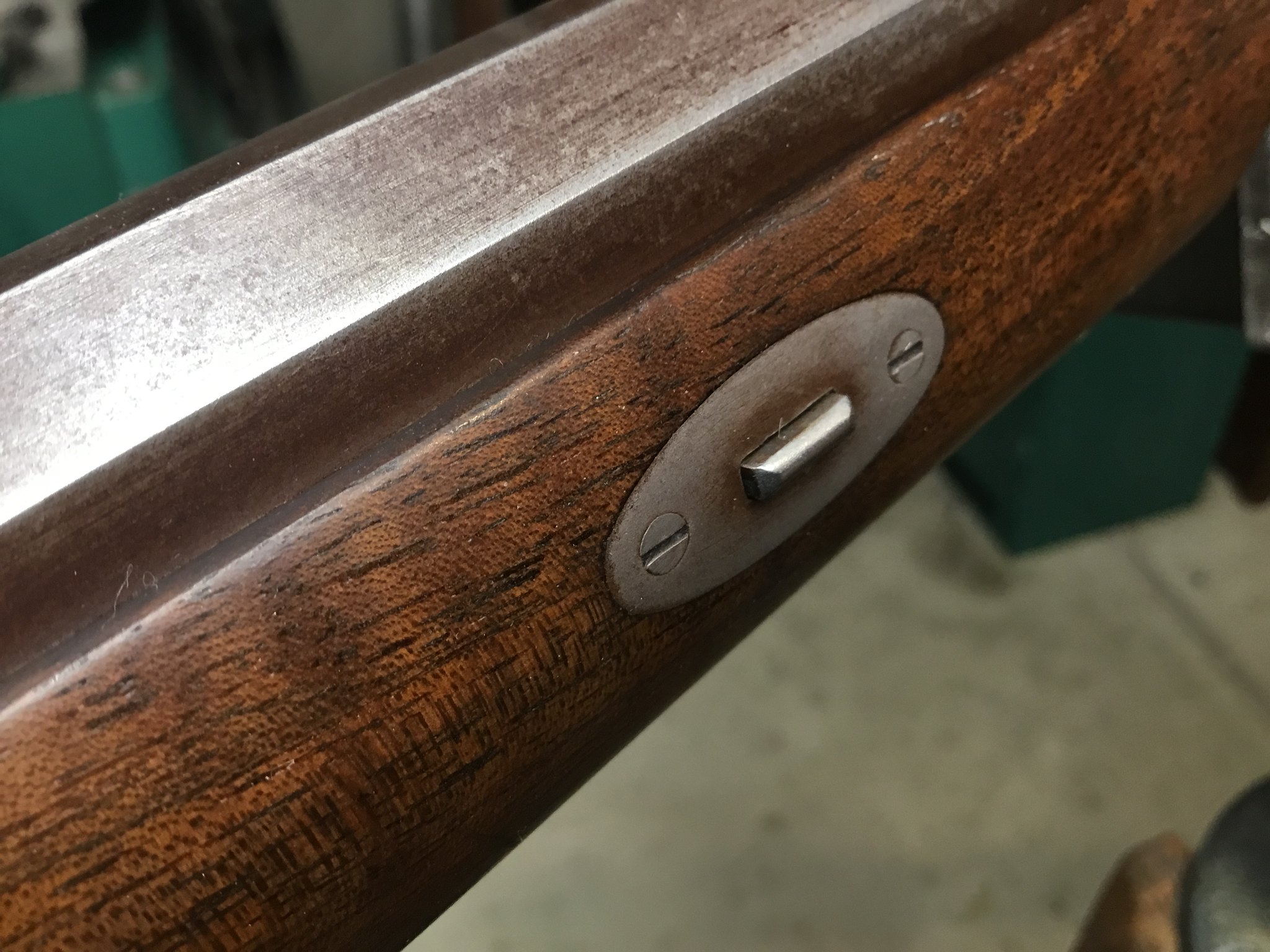In this photo, I can agree with @Phil Coffins that the inlay is to decorate the place where the pin holding the barrel in the stock is located. There is a pin holding the thimble in place barely visible above the thimble. The pin in the inlay is located just about where the pin holding the barrel in the stock would be located. Phil's suggestion about using a piece of paper and a dirty thumb to mark the outline of the inlay. I have used it to make an inlay for my Kennedy SMR replica. You can easily make it from a sheet of brass available from a hobby shop. The inlay itself is likely to be glued in place as I see no pins in the inlay or marks in the recess where the lost inlay was located. The pin for the barrel lug needs a loose fit through the inlay.View attachment 277126
How’s that?
You are using an out of date browser. It may not display this or other websites correctly.
You should upgrade or use an alternative browser.
You should upgrade or use an alternative browser.
NEED HELP PLEASE !
- Thread starter nobody1369
- Start date

Help Support Muzzleloading Forum:
This site may earn a commission from merchant affiliate
links, including eBay, Amazon, and others.
longcruise
70 Cal.
The orientation of the inlays is driving drought and climate change in your locality. 
flatcreek
40 Cal
The inlay can be easily made. A problem is holding them in, when installing the barrel pins they can easily be knocked loose.
Phil Coffins
69 Cal.
That is why the hole that the pin or wedge goes threw is slightly larger then the pin. The wood is the only part the pin or wedge bears against so the removal or installation of the pin never touches the escutcheons. Can’t say how many times this one has been out and back in over the last forty or so years but it doesn’t touch on either side.The inlay can be easily made. A problem is holding them in, when installing the barrel pins they can easily be knocked loose.
 C0744EA9-2C5C-4462-AA6F-4DC344891BF5 by Oliver Sudden, on Flickr
C0744EA9-2C5C-4462-AA6F-4DC344891BF5 by Oliver Sudden, on Flickrnobody1369
32 Cal.
- Joined
- Feb 15, 2010
- Messages
- 18
- Reaction score
- 8
yes sirThe inlay can be easily made. A problem is holding them in, when installing the barrel pins they can easily be knocked loose.
been there, that was always a problem
i dont remove my barrel too often once a year maybe
where can i find material to make inlay?
flatcreek
40 Cal
Any little piece of brass you can find or buy thats the right thickness should work. Make sure when the pin passes without touching the brass as per Phil Coffins.
Last edited:
Thanks Phil C....I gained some knowledge here today.Place a piece of paper over the inlet and tape the ends down so it can’t move. Then with a dirty finger rub gently over the paper to make a copy of the inlet. Remove the paper and glue it to a piece of brass that is the right thickness. Cut out on the mark that your finger made and taper the edge and drill the hole slightly larger than the pin. Bend the brass to match the contour of the stock. Install with tiny pins.
IMG_0494 by Oliver Sudden, on Flickr
- Joined
- Jan 24, 2005
- Messages
- 3,281
- Reaction score
- 6,639
I rough the back thoroughly and assemble using 24 hour epoxy resin and good clearance on the pin; the inlay should be for decoration only.The inlay can be easily made. A problem is holding them in, when installing the barrel pins they can easily be knocked loose.
Pete G
76 Cal.
Be aware that the other inlays are probably close to popping out also.
I have a jewlers saw for cutting brass sheet into inlays. I believe track of the wolf stocks them and brass sheet goods in different thickness. If I have to glue something to a stock I grind the back so it has a better grip for the epoxy to bond. Clean the surface with alcohol.
You have received great advice. Only thing I would also suggest is anneal the brass in lay. This way it will contour to your stock much easier.
Also make sure you mask off your stock so your glue you use doesn't get on your stock finish.
Also make sure you mask off your stock so your glue you use doesn't get on your stock finish.
- Joined
- Nov 16, 2009
- Messages
- 4,563
- Reaction score
- 8,137
Ace hardware has what you need.yes sir
been there, that was always a problem
i dont remove my barrel too often once a year maybe
where can i find material to make inlay?
Similar threads
- Locked
- Replies
- 5
- Views
- 705
- Locked
- Replies
- 4
- Views
- 374
SOLD - Pending funds
Half stock percussion 50 ca PRICE DROP
- Replies
- 6
- Views
- 886



